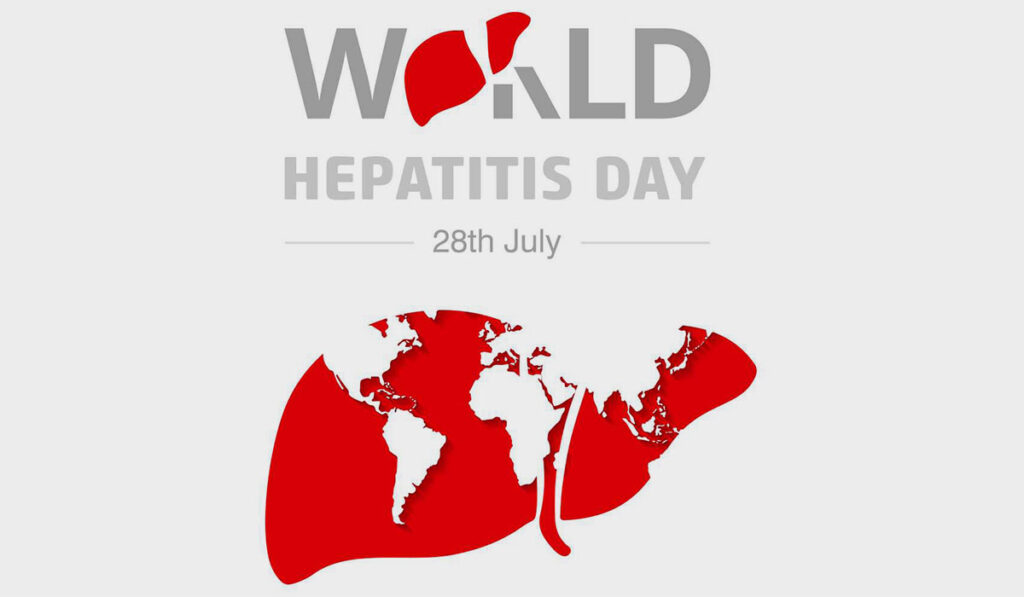The World Hepatitis Day is being observed today, July 28, 2024, with the theme ‘It’s Time for Action.’ This theme highlights the urgent need for swift and decisive measures to tackle hepatitis on a global scale. This call to action is reinforced by the alarming statistic that every thirty seconds, someone dies of a hepatitis-related illness globally.
Understanding Hepatitis
Hepatitis refers to inflammation of the liver, commonly caused by viral infections, though it can also result from toxic substances, such as alcohol or certain drugs, and autoimmune diseases. There are five main types of hepatitis viruses: A, B, C, D, and E, each differing in transmission, severity, and outcomes.
- Hepatitis A: Typically transmitted through ingestion of contaminated food or water. It causes acute liver disease but usually resolves without lasting liver damage.
- Hepatitis B: Spread through contact with infectious body fluids, such as blood, during childbirth, sexual contact, or needle sharing. It can cause chronic liver disease and is preventable by vaccination.
- Hepatitis C: Primarily spread through blood-to-blood contact, often via unsafe injection practices, transfusions, and inadequate sterilization of medical equipment. It can lead to chronic liver disease, liver cancer, and death.
- Hepatitis D: Occurs only in those infected with hepatitis B, as it needs the hepatitis B virus to replicate. It is spread through contact with infectious body fluids and can cause severe liver disease.
- Hepatitis E: Transmitted through ingestion of fecal matter, typically via contaminated water. It usually causes acute liver disease but can be severe in pregnant women.
The Global Burden of Hepatitis
Hepatitis affects millions of people worldwide, with hepatitis B and C being the most common and deadly. According to the World Health Organization (WHO), 296 million people are living with hepatitis B, and 58 million people have chronic hepatitis C. Together, these viruses cause around 1.1 million deaths annually, primarily due to liver cirrhosis and liver cancer.
‘It’s Time for Action’: The Theme of 2024
The theme of World Hepatitis Day 2024, ‘It’s Time for Action’ underscores the urgency of implementing effective strategies to prevent, diagnose, and treat hepatitis. The global community is called upon to accelerate efforts to meet the WHO’s goal of eliminating hepatitis as a public health threat by 2030.
Key Actions for Tackling Hepatitis
- Increase Vaccination Coverage: Vaccines for hepatitis A and B are highly effective. Increasing vaccination coverage, particularly in high-risk populations and regions, is crucial.
- Improve Screening and Diagnosis: Early detection of hepatitis B and C can prevent complications and transmission. Expanding access to affordable and accurate diagnostic tests is essential.
- Enhance Treatment Access: Antiviral medications can manage hepatitis B and cure hepatitis C. Ensuring these treatments are affordable and accessible can save lives and reduce transmission.
- Promote Safe Practices: Educating communities about safe injection practices, blood transfusion safety, and safe sex can significantly reduce the spread of hepatitis.
- Strengthen Healthcare Systems: Building robust healthcare infrastructures to support prevention, diagnosis, treatment, and monitoring of hepatitis is vital for sustained progress.
The Role of Governments and Organizations
Governments and organizations play a critical role in combating hepatitis. Comprehensive national hepatitis plans, adequate funding, and international cooperation are necessary to achieve global targets. Key stakeholders include:
- World Health Organization (WHO): Provides global leadership and technical support to countries in their efforts to combat hepatitis.
- Governments: Must implement and enforce policies, allocate resources, and ensure that healthcare systems are equipped to address hepatitis.
- Non-Governmental Organizations (NGOs): Play a crucial role in raising awareness, providing community-based services, and advocating for policy changes.
- Healthcare Providers: Essential in diagnosing, treating, and educating patients about hepatitis.
Raising Awareness: The Key to Prevention and Control
Awareness campaigns are instrumental in educating the public about hepatitis, reducing stigma, and encouraging preventive behaviors. World Hepatitis Day provides a platform for these campaigns, helping to disseminate information and mobilize action at the grassroots level.
Community Engagement and Education
Engaging communities through educational programs, workshops, and media campaigns can lead to better understanding and proactive measures against hepatitis. Key messages include:
- The importance of vaccination for hepatitis A and B.
- The need for regular screening, particularly for those at high risk.
- Safe practices to prevent transmission, such as using sterile needles and practicing safe sex.
- The availability of effective treatments for hepatitis B and C.
Success Stories and Progress
There have been notable successes in the fight against hepatitis:
- Increased Vaccination Rates: Countries like China have significantly reduced hepatitis B infections through widespread vaccination programs.
- Innovative Treatments: The development of direct-acting antivirals (DAAs) for hepatitis C has transformed the treatment landscape, offering high cure rates.
- Global Partnerships: Initiatives like the World Hepatitis Alliance bring together stakeholders from around the world to share best practices and drive collective action.
The Path Forward
Despite the progress, challenges remain. Ensuring equitable access to vaccines, diagnostics, and treatments, particularly in low- and middle-income countries, is critical. Continued investment in research, healthcare infrastructure, and education will drive the global effort toward hepatitis elimination.
Conclusion
As we observe World Hepatitis Day today, July 28, 2024, with the theme ‘It’s Time for Action,’ it is imperative that we renew our commitment to eradicating hepatitis. Through collective effort, informed action, and sustained advocacy, we can achieve a world free from the burden of hepatitis. Let today be a reminder of the lives we can save and the healthier future we can build together.
4o







